We analyze the continuing problems with the HealthCare.gov website; Republicans are in a “recovery” mode to reunite the party and rebuild the brand; and growing tensions over the U.S. surveillance of foreign leaders. Joining Gwen: John Dickerson, Slate Magazine; Kimberly Dozier, Associated Press; Peter Baker, The New York Times; Beth Reinhard, National Journal.

Video Currently Unavailable
Full Episode: HealthCare.gov Troubles & GOP Intra-Party Battle
Sep. 03, 2014 AT 3:30 p.m. EDT
TRANSCRIPT
Notice: Transcripts are machine and human generated and lightly edited for accuracy. They may contain errors.
GWEN IFILL: The key to getting out of a hole: stop digging. That applies to health care and to spying on one’s friends. We’ll explain how, tonight, on “Washington Week.”
PRESIDENT BARACK OBAMA: (From tape.) Nobody’s madder than me about the fact that the website isn’t working as well as it should, which means it’s going to get fixed.
MS. IFILL: But not soon enough. As the health care rollout stumbles from week to week, Republicans smell opportunity.
REPRESENTATIVE ERIC CANTOR (R-VA) [House Majority Leader]: (From tape.) The rollout of “Obamacare” is nothing short of debacle. And the American people are now fearful of their health care.
MS. IFILL: And Democrats begin to worry.
REPRESENTATIVE XAVIER BECERRA (D-CA): (From tape.) We’re not interested in hearing about glitches. We’re interested in moving forward.
MS. IFILL: But can Republicans resolve their own internal fights?
FORMER SENATOR TRENT LOTT (R-MS) [Former Majority Leader]: (From tape.) They fought the good fight but that fight’s over. So now what are we going to do?
REPRESENTATIVE TIM HUELSKAMP (R-KS): (From tape.) I think at the end of the day, for conservatives we lost the battle, but we are going to win the war. Just look at the debacle of the rollout of “Obamacare.”
MS. IFILL: And can the administration regain its own footing on the world stage?
JAY CARNEY [White House Press Secretary]: (From tape.) The U.S. is reviewing the way that we gather intelligence to ensure that we properly balance the security concerns of our citizens and allies with the privacy concerns that all people share.
MS. IFILL: Tell that to Angela Merkel. Covering the week: John Dickerson of Slate Magazine and CBS News, Beth Reinhard of National Journal, Kimberly Dozier of the Associated Press, and Peter Baker of the New York Times.
ANNOUNCER: Award-winning reporting and analysis, covering history as it happens, live from our nation’s capital this is “Washington Week with Gwen Ifill.”
(Station announcements.)
ANNOUNCER: Once again, live from Washington, moderator Gwen Ifill.
MS. IFILL: Good evening. You may have heard the government is open, the debt ceiling has been raised, and we are right in the thick of a new set of Washington crises. The White House announced today it has finally, completely, definitively found someone to fix the new federal website that has bedeviled so many who tried to sign up for health care. HealthCare.gov, which rolled out October 1st, will be ready for prime time – really this time – by the end of November. And for now, it appears Health and Human Services Secretary Kathleen Sebelius will get to keep her job.
SECRETARY OF HEALTH AND HUMAN SERVICES KATHLEEN SEBELIUS: (From tape.) The majority of people calling for me to resign, I would say are people who I don’t work for and who do not want this program to work in the first place.
MS. IFILL: This is probably true, but it’s not the worst part of President Obama’s no good, very bad week.
PRESIDENT OBAMA: (From tape.) The problem has been that the website that’s supposed to make it easy to apply for and purchase the insurance is not working the way it should for everybody. There’s no sugarcoating it. The website has been too slow. People have been getting stuck during the application process. And I think it’s fair to say that nobody is more frustrated by that than I am.
MS. IFILL: And then, the woman standing behind him fainted. So how did this big deal rollout go so wrong, John?
JOHN DICKERSON: Her faint was sort of an artistic interpretation of the entire week.
MS. IFILL: Slow motion.
MR. DICKERSON: The HealthCare.gov came out and it just – it collapsed. So what happened? It’s a mess, but let’s back up a little bit. The first thing that happened is the federal government had to open more of these exchanges than they thought they would because some states decided they didn’t want to. So the burden was lifted on the administration a little bit.
Then, the Department of Health and Human Services delayed the regulations and the instructions about how these exchanges were put together inside these administrations. Some people say those were delayed because of election year concerns. They didn’t want to raise anything in creating these exchanges that would cause the president a headache with his reelection. Well, so that delayed everything though. So now everybody is in a terrible rush.
And we’re talking about 55 different contractors putting this thing together. And, at the top of it sits the Centers for Medicare and Medicaid, which has never run this kind of show before. So they’re in a rush. There are a lot of them. And it’s incredibly complex.
But there’s more problems, which is that, at the end, they hadn’t tested it in the way that you’re supposed to test these kinds of things. Not only did the top, the CMS, the Centers for Medicare and Medicaid, not test things, but the contractors didn’t do the testing they should have done either. When they did test it, it collapsed under very little pressure. Then, when it rolled out, there was a lot of more pressure than they’d guessed.
MS. IFILL: Of course it collapsed.
MR. DICKERSON: And it collapsed spectacularly. And I should say, finally, this was the president’s signature domestic policy achievement. And, apparently, he didn’t know about it and the head of the Department of Health and Human Services didn’t know about it.
MS. IFILL: And yet, it fell to him to walk into the Rose Garden and start hawking the 800 numbers like a guy selling ShamWows in the middle of the night.
MR. DICKERSON: Right. Well, damage control. I mean, he was trying to say two things: one, I’m furious and this is going to get fixed, but the underlying product, the health care reform, his signature product here, is fine and it’s OK. The problem is that – and there has been a kind of spiraling credibility problem here as they try to figure out how to get on top of this. The president said, well, you can make a phone call. So people went to make phone calls. And I talked to one person who called up and they said, well, go to the website. So it was problematic.
And also, as you mentioned, they now say, well, by the end of November, they’re going to have something that might work. But the problem is that they really don’t know that. It may come in shorter than that. But the problem now is they’re still figuring out – I mean, they’re doing kind of an autopsy while they’re also trying to revive the patient because they’re trying to figure out what went wrong but also fix it very quickly. And it’s not clear whether they can do it so fast.
PETER BAKER: That’s just what you wanted in a health care system, by the way, an autopsy while you’re operating that patient. But it seems to me, if you listen to Republicans talk about this, because, of course, they’re very concerned about a program that they don’t support not working. But the Democrats actually are the ones who might pay a price, right? I mean, what is the political impact on Democrats?
MR. DICKERSON: Right. I mean, it is – funny, the Republicans worked so hard to try and kill this, it’s almost as if they’re jealous that the administration did a better job in undermining it than they did.
For Democrats the problem is this, is that there’s this credibility problem, which is that people look at this and say, this is just a mess. And we’re getting story after story that doesn’t turn out to be true. And that links up with the bigger problem people have had about this health care program in the first place, which is the president said, if you have a doctor in a health care plan that you like, you’ll be able to keep it. Well, that’s not true.
Now, in some cases, it’s not true for sort of good reasons, which is to say that the health care plan you’ll have will be better than what you had before, but still, as the way politics works, if the president makes you a promise and that promise doesn’t turn out to be true, that’s a problem, and that’s a problem for Democrats. Why? Because the people who already have insurance are the ones who see this credibility problem, who see this disaster, and think it’s going to affect their health care. And that scares them. And that’s why there are a lot of Democrats who are saying, you know, let’s fix this. And they’re feeling the heat.
KIMBERLY DOZIER: Now, all this time, week by week, they were supposed to be signing up patients, and they’re not. When do they have to have it fixed by before it starts crashing into the estimates and raising health care costs?
MR. DICKERSON: Right. So the real game here is to try and sign up younger voters. That’s the key. When you talked to the administration before this was launched, they said, we’ve got one key thing we want to do with this website. And this was important, which is get young people in because you need young people to improve the risk pool for insurance. So they need to get those in fast. I think the drop dead deadline is the end of November. We’ll see.
MS. IFILL: We’ll see. OK. Well, as Democrats work to dig themselves out of that health care hole, Republicans were happy for the change of topic. That’s because they’re still busy fighting among themselves. Compare the rhetoric of Mississippi’s Trent Lott, a former Senate Republican leader, with Kansas’ Tim Huelskamp, a current tea party House member. They both appeared on the “NewsHour.”
MR. LOTT: (From tape.) We don’t need a civil war. We need to focus on what is a good agenda for growth in America. So I think what we need to do is to focus on the positive and quit attacking each other.
REP. HUELSKAMP: (From tape.) I know there are folks currently in the U.S. Senate that said, hey, that wasn’t a good strategy. But you know what? They had no strategy other than giving the president everything they wanted. And that’s a losing strategy as well.
MS. IFILL: That tea party caucus is giving mainstream Republicans hoping to get reelected a lot of heartburn these days. Beth Reinhard says they’re preparing to fight back. Are they?
BETH REINHARD: They are. They are. They’ve been talking about this really since November, when Mitt Romney, Republican nominee, lost. And it exposed really how the Republican Party’s reach has gotten very narrow. And so there’s a lot of talk about expanding the reach of the party beyond conservatives.
Then comes the shutdown and the Republican Party’s poll numbers get to the lowest – record lows. And so now you’re having these conversations start to get in earnest, and also, with a sense of urgency because 2014 campaigns are starting to ramp up. And, you know – so this rift between the establishment Republicans and the tea party has just broken wide open.
MS. IFILL: And it goes deeper than Ted Cruz.
MS. REINHARD: It goes much deeper than Ted Cruz. And it goes to races that you’re going to see playing out all over the country over the next, you know, year and a half. In the House, in the Senate, governors’ races, you have a lot of big governors, tea party governors up next year.
It also crosses into sort of the internal workings of the parties. It goes to the leadership of the state parties who make a lot of decisions about how candidates are going to be nominated. Will it be an open primary where you have a large cross-section of voters participating, or will it be at a convention, where you have a few very conservative activists usually dominate those kind of nominating conventions?
MR. BAKER: You wrote – you wrote in your piece about how one of the leaders of the establishment Republicans wants to pick some races and go out and beat the snot out of them? Is that what the phrase was? It doesn’t seem like the tea party is going to lie down and take it. What’s their response going to be if this happens?
MS. REINHARD: Yeah. That’s really – this is like sort of a very delicate operation because sort of the more of the establishment talks about we’re here from Washington and we’re here to help, the more the tea party sort of gets their fists ready.
And so, you know – but what else are they supposed to do? So it will be interesting to see how much more the tea party digs in. I would expect them to. You know, they have a lot of momentum, a lot of passion. You know, they’re –
MS. IFILL: They’ve been declared dead more than once before.
MR. DICKERSON: Sometimes in these races, when you have the activist core of a party fighting against that kind of establishment, the establishment always in non-presidential years has trouble because they’re not as stirred up as the activists are, who are in a permanent state of agitation. So, you know, people may want to bring in outside money into these races, but is it going to be effective at all?
MS. REINHARD: I think people are motivated because there’s so much at stake, because Republicans feel like they could have done better in 2012, they could have taken the Senate and there were some missed opportunities. And now, they see another possibility and they can’t let that slip through their fingers. And there’s also, you know, the possibility of the House. You know, they have – the Republicans have a pretty good margin, but the shutdown has hurt the party’s numbers so badly that there’s talk that even, you know, a takeover of the House is possible. So I think that will be a very motivating force.
MS. DOZIER: And how is this going to play out on the popular level the next time a tea party candidate goes for a vote?
MS. REINHARD: Well, I think you’re going to see establishment Republicans, who in the past have been, you know, sort of grumbling under the breath about these guys that are, you know, extremely – I don’t mean to say guys but also ultra conservative. And what’s funny about that is the tea party folks have never been shy about criticizing establishment Republicans. And so I think in a way, the establishment is going to have to learn from the tea party to be a little less fearful.
MS. IFILL: What we’re seeing play out, for instance, in Virginia, governors’ race, in places like Idaho and Alabama, all over – Alaska, all over the country, so the question I guess for me is how do the main streamers or even the tea partiers discourage more Todd Akins and Christine O’Donnells, who share their views but can’t get elected?
MS. REINHARD: I don’t know that they can solve that problem. I mean, this isn’t the kind of thing that like someone can develop a master plan in Washington and pass it out to all these states and everyone is going to follow it. You can’t control who runs for office. And, in some of these races, like you mentioned Alaska, and Georgia is another one where you have many candidates running, it’s not so easy for the establishment just to rally behind the one person they like when there’s a lot of candidates. So it gets very complicated.
MS. IFILL: OK. Well, we’re going to be watching all of them. Much more fun that way.
But our domestic political navel-gazing is nothing compared to the uproar U.S. policies have stirred this week abroad. And that’s from our friends. Once again, we have Edward Snowden to thank or to blame for new revelations that U.S. spy agencies may have been monitoring the private telephone calls of as many as 35 world leaders. Among the most obviously peeved, German Chancellor Angela Merkel.
ANGELA MERKEL [Chancellor of Germany]: (From tape, translated.) We are closely tied in with the U.S. and trust is an important part of the relationship. And now, that trust has to be reestablished between us. Spying among friends is never acceptable.
MS. IFILL: That seems to make perfect sense, spying on friends is never acceptable. So what do we know about what really happened, Kim?
MS. DOZIER : We’re shocked, shocked that there’s this spying going on.
MS. IFILL: Drinking in this bar, right.
MS. DOZIER: Indeed. So according to some of the documents leaked by Edward Snowden, the U.S. National Security Agency may have been listening in to Angela Merkel’s personal cell phone calls and other leaders’. Now, the White House has been coy about this. They have said, we’re not listening to them now and we won’t in the future. They didn’t say anything about what happened in the past.
MS. IFILL: Boy, that sounds like the meaning of is is.
MS. DOZIER: And we’ve asked them several times and they always come out with the same pat answers. So what this has done is lifted that veil off how espionage works. The U.S. and four other countries basically trust each other enough not to spy on each other. That’s the Five Eyes countries, Britain, France, New Zealand – sorry. Not France – Britain, Australia, New Zealand, the U.S. and Canada. Beyond that, all bets are off. So spying on the French, back and forth, we do that regularly.
MS. IFILL: Brazil.
MS. DOZIER: Brazil. Some places, it’s very aggressive. CIA officers will tell you that when they go to a place like Israel, they count on their hotel rooms, their homes, their computers being rifled through. This is just part of the game. Now, what the U.S. has said in its defense is everyone is relying on the U.S. intelligence service; we share our information with Germany. Angela Merkel herself used that as a defense the last time there have been revelations about the U.S. spying on German citizens. She’s just a little bit angrier now that it’s been revealed they were actually listening to her.
MS. IFILL: Yeah.
MR. BAKER: You know, it’s interesting – she’s not the first foreign leader to have this concern this year. Brazil’s President Dilma Rousseff learned from media reports that maybe her communications were being intercepted and she cancelled a state visit in protest. I remember the White House at the time said privately, they said, well, you know, the Brazilians are really upset because they don’t actually spy. They don’t have any real spying. The Europeans are sophisticated grownups who understand. They spy so they’re not so mad when they discover stuff. They look mad.
MS. DOZIER: Mad but also this is an opportunity. They are using this now to demand a similar relationship with the United States like the Five Eyes nations. They want more seamless sharing. They want to take a look at more of this raw intelligence that the U.S. sometimes shares. They’re sending the German national and international intelligence chiefs over here to negotiate. So, yes, everyone knows spying goes on, but now that it’s out in the open, why not take advantage of the U.S. humiliation over it.
MR. DICKERSON: Do we have any idea how much more of this is going to come out into the open? It seems like we’re on a regular clock here. Every couple of weeks, we get something new.
MS. DOZIER: Probably at least another, you know, year of revelations. We’ve, according to some officials, only seen a very small percentage of what Edward Snowden took when he was working as a systems analyst for the NSA. They’re still trying to figure out every last document. They’re really not sure.
MS. REINHARD: And what does that – what role did Edward Snowden play in this most recent round of revelations?
MS. DOZIER: Well, to hear him or the lawyers representing him tell it, he gave batches of documents to various different reporters before he got asylum in Russia, because one of the conditions of getting asylum there was he was not going to continue to leak. He has sent this stuff out, though, in a complicated encrypted fashion so that our understanding is at least someone somewhere along the chain has to be cooperating to access some of the new documents. That said, we have talked to reporters, like the Washington Post told us at the AP that they had so many documents that they’re still working through a lot of it to figure out what they’ve got.
MS. IFILL: We laugh a little bit about this being like “Casablanca,” we’re shocked that there’s drinking going on, but, I mean, earlier this week, we have heard that the relationship with Pakistan, who the president’s meeting with, has been very unhappy because of drone strikes. And yet, it seems that Pakistan may know about these drone strikes a little bit but they have to say that they don’t. Is that part of what’s going on here as well?
MS. DOZIER: Well, this is another one of those situations where the U.S. for a very long time let Pakistan basically pretend it didn’t know the strikes were going on or weren’t able to stop them, when actually there were behind-closed-doors deals on whether the U.S. could strike. Now, the government of Musharraf that agreed to those deals has long since passed away, but the U.S. is still sticking to those deals. And officials will tell you, we’re going to keep flying the drones until they physically shoot one out of the sky. And, occasionally, the Pakistanis cooperate with the U.S. when a target comes into view that they want taken out and don’t have the capability to reach.
MS. IFILL: It’s all very complicated. Everybody’s angling for a position it seems like.
Well, there’s always a temptation to believe that everything we’re witnessing right now, including everything we are talking about here tonight has never happened before. And that’s almost never true. We have more evidence of that in Peter’s new book, “Days of Fire: Bush and Cheney in the White House.” There are tons of interesting nuggets throughout the book, but for our purposes here tonight, here are two.
President Bush also encountered technical difficulties when he rolled out his own ambitious health care expansion in 2006; and spying on our friends and enemies became a staple of intelligence behavior after President Bush’s Patriot Act was passed. So let’s start with the Bush health care plan, Peter. How is that like what we’re seeing now?
MR. BAKER: Yeah. That’s a great question. So he expanded Medicare to cover prescription drugs. That was the big change in the first term of President Bush. And if you go back and look at the stories about the rollout in 2006, guess what you see. You see words like “glitches.” You see “website not working.” You see “confusion.”
And that in some ways was an easier lift than this one because you were dealing with an existing population. They were expanding a program that already existed, Medicare. They knew who their recipients were. They were the 40 million people who get Medicare. They knew – in this case, we’re talking about uninsured people who we don’t know who they are. We don’t have a database for them. So it was a lot easier, arguably, back then.
But I was talking with somebody about that today to make the comparison. He says, look, today’s rollout problem is much more serious than what happened in 2006. That was a prologue to this. And what we’re seeing now is probably more systemic and more difficult for the administration to move forward on.
MS. REINHARD: Peter, was the expansion as controversial as this health care law? I mean, was there as much of a struggle to pass the law and as much controversy after it passed?
MR. BAKER: Yeah. It’s a really good question. There was controversy and it was partisan. The Republicans wanted to expand the drugs but they wanted to – the drug coverage, but they wanted to do it in a more – what they saw as a free market way. Democrats thought that was a pro-business way. And they fought about this. In fact, the night that the House passed the plan, the House leadership Republicans kept the vote open for hours trying to twist some arms and get those final few votes.
And there was a really interesting moment. The president has just been over in Europe. He’s asleep finally back at the White House. And they wake him up to talk to a few conservatives who are on a phone, sitting in the cloak room, and he’s got on speaker phone. And one of the conservatives, a young, a relatively junior Republican Trent Franks says, I want you to promise – I’ll give you my vote if you promise to put pro-life conservatives on the Supreme Court. Bush is like, well, you know – you know, let me tell you about my Medicare program. No, I’ve got to have this commitment. In effect, he says – and Bush says, enough. Whatever he said, there’s some dispute about what he said – enough that the congressman walked away thinking he had that commitment, and he switched his vote.
So a lot of things go into this. Now, the difference though – sorry – but the difference is that after it passed, when the rollout happened, Democrats were at that point interested in making it work. They were not still fighting at this point like the Republicans are still fighting this. And so while they weren’t – they’re critical, they had it in their interest to try to fix the problem.
MS. IFILL: What about the surveillance piece of this? It seems to me that that also really began under – this idea that we spy on everybody every possible way for our own security began post-9/11 with Bush. Is that wrong?
MR. BAKER: Well, I mean, we’ve been spying on our allies and friends for decades and centuries, you know. Henry Stimson, the secretary of state, once famously said, gentlemen don’t read each other’s mail, but in fact we’ve been trying to read mail for quite a long time.
And there’s, to remind you, times during the Bush administration they did pass the Patriot Act. They started a lot of these NSA surveillance programs that have continued over Obama and been so controversial. I remember in the time of March 2003, they were getting ready to go to war in Iraq and they were trying to get passage of a resolution at the U.N. Security Council. Well, the revelations that they were spying on the phone calls of the U.N. delegations of a number of the nil votes, the ones they were trying to win over so that didn’t go over very well.
MS. DOZIER: So why did the Obama administration support expanding some of these authorities?
MR. BAKER: It’s interesting, right? Because he runs for office saying, I’m going to basically going to take 180-degree turn from where Bush was. Bush had all these things wrong. And the truth is, you know, when you get in the Oval Office and they tell you, here are all the different ways bad guys are trying to kill Americans and you’re responsible if it happens, I think it begins to look a little different than it does when you’re a candidate on a trail.
MS. IFILL: It concentrates the mind.
MR. BAKER: It does. Yeah.
MS. IFILL: Did you have –
MR. DICKERSON: Well, no. I was just going to say the extent to which President Obama benefits from some of the spadework that President Bush and Vice President Cheney did in terms of a lot of the heat they got.
MR. BAKER: Absolutely. Oh, absolutely. And the thing is he ran against Bush his first term, but he inhereted Bush’s second term. By the time Bush leaves office, he’s actually already moderated a lot of the most controversial programs he’d put in place, shaved off the harsh edged, went to Congress and got some buy-in on some of them so that when Obama came in and promised to change them, he didn’t have to make as many changes as you might have thought because they were already changed.
MS. IFILL: That’s why presidents all get along so well after they’ve been president because they begin to understand what the choices are.
Thank you all very much. We have to go, but the conversation, as always, will continue online, on the “Washington Week Webcast Extra,” where Peter and I will chat some more about why everything you thought you knew about the relationship between George W. Bush and Dick Cheney is probably wrong. That streams live at 8:30 p.m. Eastern and all weekend long.
You can keep up with daily developments on the PBS “NewsHour” now seven days a week. And we’ll see you right here again, next week, on “Washington Week.” Good night.
FROM THIS EPISODE

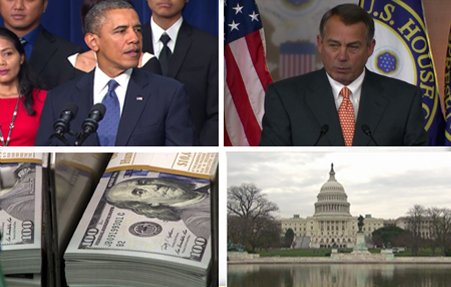
Full Episode: Budget vs. Obamacare, Next Step for the Fed, and Reviving Gun Control Debate

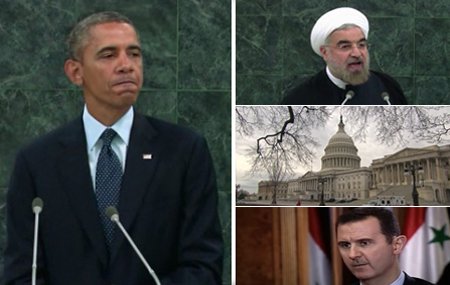
Full Episode: Budget Battle, Obamacare, US-Iran relations, Syria

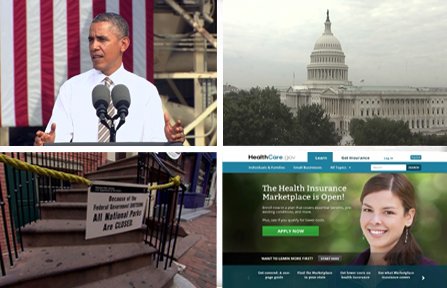
Full Episode: Government Shutdown, Debt Ceiling Debate & Health Insurance

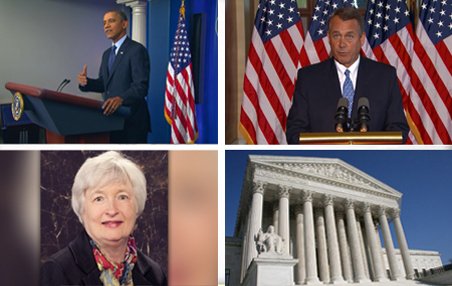
Full Episode: Government Shutdown, Short-Term Debt Deal, Yellen to the Fed

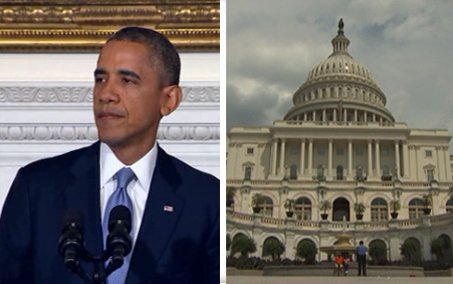
Full Episode: Post-Shutdown Washington: Political Divides & Dysfunction


Full Episode: Healthcare.gov Repairs, NSA Spying, and Public Opinion


Full Episode: Election '13 Takeaways, Healthcare Rollout Woes Continue


Special: Webcast Extra: 2014 Midterms and Obama’s Secret Weapon


Special: Webcast Extra: Obama's Governing Woes and Christie in 2016

© 1996 - 2026 WETA. All Rights Reserved.
PBS is a 501(c)(3) not-for-profit organization
